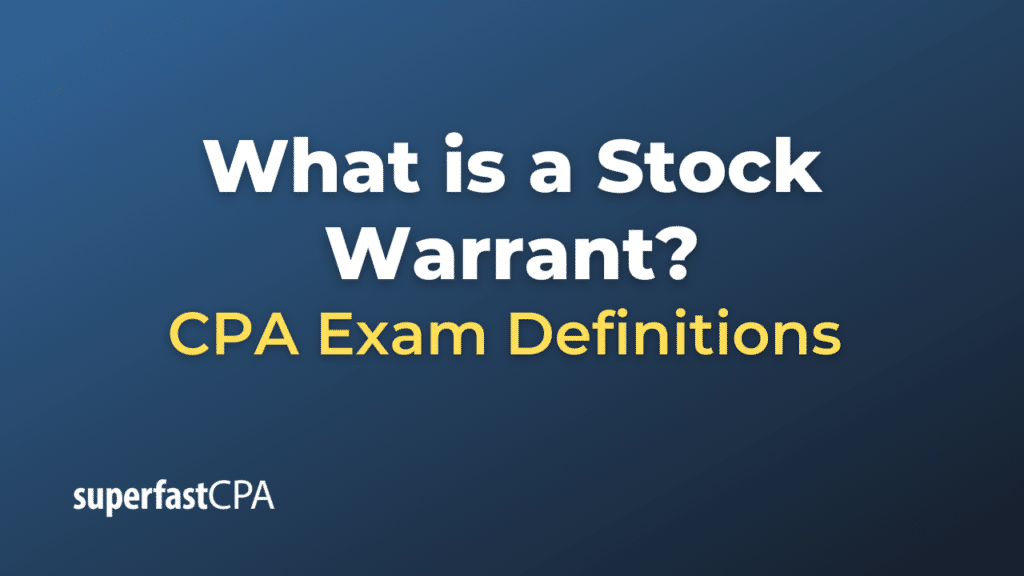Stock Warrant
A stock warrant is a financial instrument issued by a company that gives the holder the right, but not the obligation, to buy a company’s stock at a specific price (called the “exercise” or “strike” price) by a specific date or during a specified period. Stock warrants are similar to stock options in function, but there are some key differences.
Characteristics and Features of Stock Warrants:
- Origin: Warrants are issued by the company itself, while stock options are typically granted to employees as a form of compensation.
- Term: Warrants usually have longer expiration terms than stock options. While stock options might expire in a few years, warrants can have life spans of 5 years, 10 years, or even longer.
- Dilution: When a warrant is exercised, the company issues new shares, leading to dilution of existing shareholders’ equity. In contrast, when an employee stock option is exercised, the shares given are typically from the company’s existing stock.
- Tradability: Warrants can often be traded in financial markets, much like regular shares. This is different from most employee stock options, which are not publicly traded.
- Dividend Rights: Holders of stock warrants are not entitled to dividends or voting rights until they exercise their warrants and receive actual shares.
Why Companies Issue Stock Warrants:
- Sweetener: Warrants can be bundled with other securities (like bonds) to make them more attractive to investors. For example, a company might issue bonds with attached warrants to entice more investors or to secure a lower interest rate.
- Raise Capital : When warrants are exercised, companies receive cash from the sale of shares at the exercise price, helping them raise additional capital.
- Strategic Partnerships: Sometimes, companies issue warrants to strategic partners as part of partnership agreements or business deals.
Example of a Stock Warrant
Let’s walk through a detailed hypothetical example to better understand stock warrants.
Scenario:
BlueSky Airlines:
BlueSky Airlines is looking to raise capital for expanding its fleet. To attract more investors, the company decides to issue bonds with attached stock warrants.
Offer Details:
- Each bond is priced at $1,000.
- Every bond comes with a warrant that allows the bondholder to purchase 10 shares of BlueSky Airlines at a strike price of $20 per share.
- The warrants can be exercised any time within the next 7 years.
- Current market price of BlueSky Airlines stock: $15.
Investment Move:
Mr. Anderson decides to purchase one of these bonds. He pays $1,000 for the bond and also receives the attached warrant.
Fast Forward 4 Years:
BlueSky Airlines has done well in expanding its routes and increasing profitability. The stock price has risen to $35. Mr. Anderson believes it’s a good time to exercise his warrant.
Exercise of the Warrant:
Mr. Anderson decides to exercise his warrant to buy 10 shares of BlueSky Airlines:
- Cost of purchasing shares using the warrant: 10 shares x $20/share = $200
- Current market value of the shares: 10 shares x $35/share = $350
By exercising the warrant, Mr. Anderson has immediately made a gain of $150 ($350 – $200), excluding any initial costs or taxes.
Further Action:
Mr. Anderson now has several options:
- Sell the Shares Immediately: He can sell the 10 shares at the current market price of $35, realizing a profit from the stock sale.
- Hold the Shares: He can choose to hold the shares, expecting further appreciation in stock value.
- Sell the Warrant: If he hadn’t exercised the warrant, depending on the terms, he might have been able to sell the warrant itself if there’s a secondary market for it.
Conclusion:
By attaching the warrant to the bond, BlueSky Airlines made its bonds more attractive to investors like Mr. Anderson. Mr. Anderson benefited from the company’s stock appreciation by exercising the warrant. At the same time, when the warrant is exercised, BlueSky Airlines receives additional capital from the sale of its stock at the predetermined strike price.













